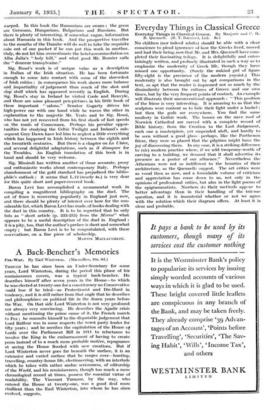A Back-Bencher's Memories
Pre-War, By Earl Winterton. (Macmillan, 10s. 6d.)
Tuouon he has since been an Under-Secretary for some years, Lord Winterton, during the period this phase of his reminiscences covers, was a typical back-bencher. He describes himself after seven years in the House—to which he was elected at twenty-one for a constituency no Conservative maid lose if he tried—as Protectionist and Die-Hard in tendency, and it. is still rather from that angle that he describes :Ind philosophizes on political life in the dozen years before the War. On that side Lord Winterton is not very profound nor always very convincing. He describes the Agadir crisis without mentioning the prime cause of it, the French march to Fez ; he commits himself to the disputable judgement that Lord Balfour was in some respects the worst party leader for fifty years ; and he ascribes the capitulation of the House of Lords over the Parliament Bill in 1911 to reluctance to involve the King in the embarrassment of having to create peers instead of to a much more probable motive, repugnance at seeing the House flooded with new creations. But if Lord Winterton never goes far beneath the surface, it is an extensive and varied surface that he ranges over—hunting, travelling, country-house life, electioneering, with an interlude which he takes with rather undue seriousness, of editorship of the World, and his reminiscences, though too Much a mere chronological record at times, possess the essential virtue of readability. The Viscount Tumour, by the way, who entered the House at twenty-one, was a good deal more ebullient than the Earl Winterton, into whom he has since evolved, suggests.




































 Previous page
Previous page